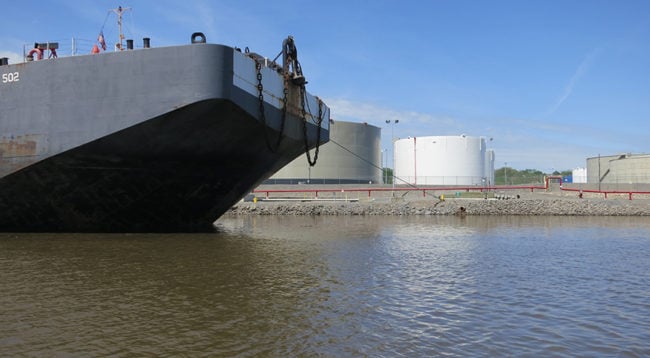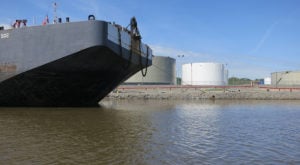DEC & environmental coalition prevail in Global terminal challenge

View more images on our Flickr site
 Huge victory for NYS, Riverkeeper and our partners after public outcry over crude oil facility expansion
Huge victory for NYS, Riverkeeper and our partners after public outcry over crude oil facility expansion
Albany, NY — Today the Appellate Division, Third Department, issued an important precedential decision finding that the state Department of Environmental Conservation had the authority to rescind a notice of complete application it previously issued to Global Companies for its application to modify the air pollution permit for its Port of Albany terminal. Global is seeking permission to expand the facility to include boilers that would heat heavy “tar sands” oil for transfer from trains to river barges for transport down the Hudson.
The Court’s decision reverses a portion of a New York State trial court ruling that would have required DEC to make a final decision on Global’s permit application within 60 days, even though DEC had determined that the application was no longer complete. DEC had also already issued a notice of intent to rescind its negative declaration under the State Environmental Quality Review Act due to changes in the project, new information that came to light during the public comment period, and changed circumstances. Global initiated this lawsuit in an effort to force DEC to make a decision on its permit application, despite these outstanding issues.
Earthjustice and the Pace Environmental Litigation Clinic represented Riverkeeper and others in this appeal. The Ezra Prentice Homes Tenants Association, a group of residents who live in a public housing development that borders the Global facility, has been fighting for the health and well-being of the community in Albany’s South End for years. Residents are already exposed to dangerous air emissions because of the current activities, and the proposed modifications would only make the situation worse. As the court recognized, in 2014, a group of petitioners including the Ezra Prentice Homes Tenants Association, Riverkeeper, and other groups, challenged DEC’s initial determination that the project would not have significant adverse environmental impacts.
Global’s application was designed to allow a massive increase in the amount of crude oil shipped down the Hudson River. Riverkeeper continues to fight for protections from the many environmental harms that could result from transporting enormous volumes of crude through the Hudson Valley. An enormous increase is neither safe nor necessary to meet the region’s energy needs, and adding boilers to heat tar sands into the mix would not only endanger the health of all those who live nearby, it would also add to already unacceptable environmental risks posed by crude oil transport.
We welcome DEC’s actions to date, which show that the agency is appropriately considering new information gleaned from the public during the environmental review of the proposed modification. Today’s decision paves the way for DEC to rescind its negative declaration and issue a positive declaration as soon as possible, so that the environmental impacts of this project can be fully vetted through the drafting of an Environmental Impact Statement.
Notably, the Court recognized the huge public outcry against Global’s modification application. Such outcries have already caused a suspension of the proposal to establish anchorages on the Hudson, a renewed push for more cleanup of the toxic PCB contamination that remains in the river (courtesy of GE) and action by DEC to appeal a decision from the Federal Energy Regulatory Commission (led by a recent Trump appointee) overriding the state’s denial of a key permit for a gas pipeline. This trend only goes to show that when the public raises its voice, decision-makers listen.
